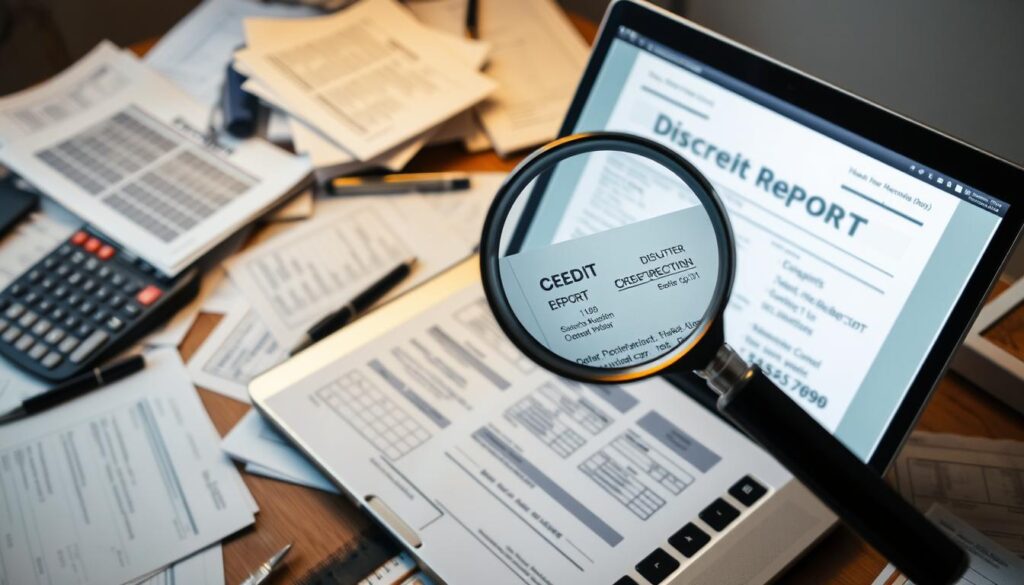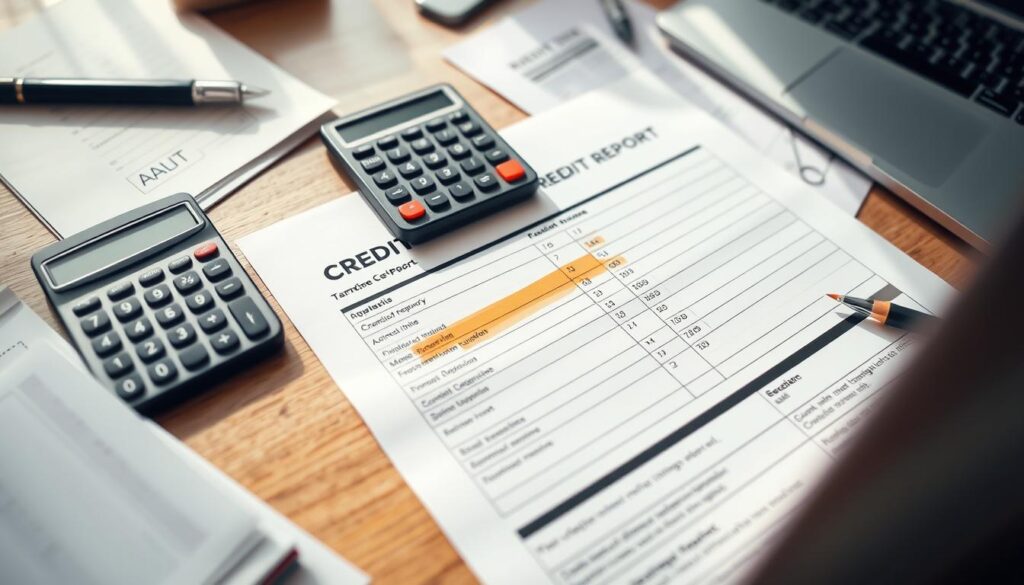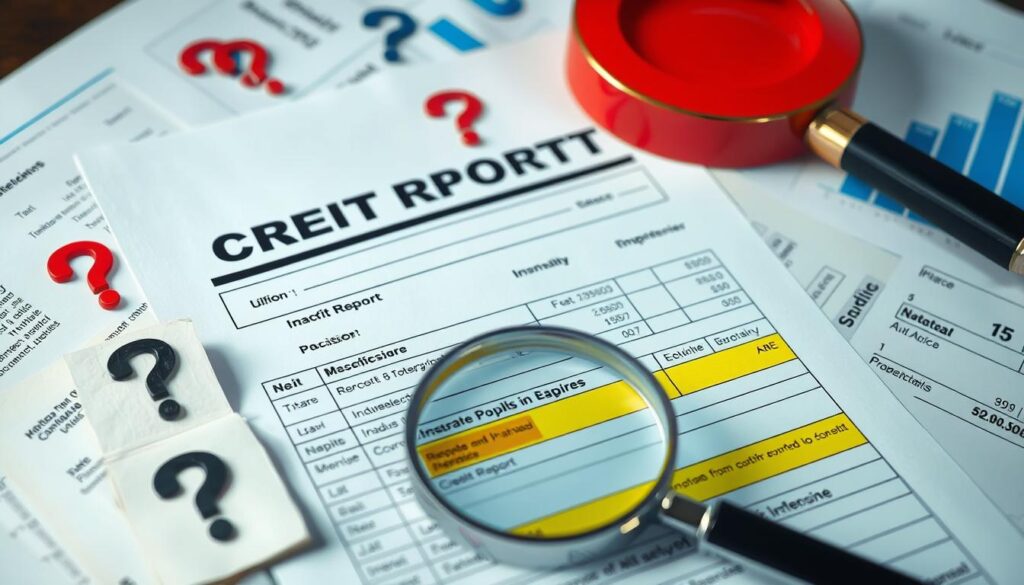A healthy credit report is vital for financial success. It helps secure good loans, qualify for mortgages, and achieve stability. Errors in your report can harm your creditworthiness.
You have the right to dispute these errors. This guide explores reasons to challenge inaccuracies and offers expert tips. We’ll show you how to improve your financial standing effectively.
Key Takeaways
- Understand your legal rights under the Fair Credit Reporting Act to dispute credit report errors
- Identify common reasons for disputing credit report inaccuracies, such as incorrect account information or fraudulent activity
- Learn the step-by-step process for preparing and filing a credit report dispute with the credit bureaus
- Discover strategies for effectively challenging unresolved credit report disputes and escalating issues with the credit bureaus
- Implement preventive measures to avoid future credit report errors and maintain a healthy credit profile
Understanding Credit Report Disputes
An accurate credit report is vital for your financial health. Errors can lower your credit score unfairly. You have the right to dispute and correct inaccuracies on your report.
Common Reasons for Disputing Credit Report Errors
You may need to dispute items on your credit report for several reasons. These include:
- Fraudulent or unauthorized accounts
- Incorrect personal information, such as an incorrect name, address, or Social Security number
- Outdated or incorrect account status, such as a closed account still being reported as open
- Erroneous payment history, including late or missed payments that never occurred
- Duplicate accounts or accounts that don’t belong to you
Legal Rights Under the Fair Credit Reporting Act
The Fair Credit Reporting Act (FCRA) protects consumers’ rights in credit reporting. It gives you the right to dispute inaccuracies on your credit report. Credit bureaus must investigate your dispute and provide results promptly.
The Fair Credit Reporting Act empowers consumers to ensure the accuracy and completeness of their credit reports, which are essential for maintaining good financial health.
Knowing your FCRA rights helps you address credit report inaccuracies. This knowledge allows you to maintain a healthy credit report.
When Disputing Credit Report What Reason
Reviewing your credit report helps maintain a healthy financial profile. Errors can occur, so it’s important to spot inaccuracies. Understanding valid reasons for disputes is crucial when challenging credit report errors.
Fraudulent or unauthorized activity is a common dispute reason. This includes unfamiliar accounts, charges, or potential identity theft. Addressing these issues protects your credit and financial well-being.
Outdated or inaccurate information is another valid dispute reason. This may involve closed accounts shown as open or incorrect payment histories. Mistakes in personal details like name or address also fall into this category.
- Identify any instances of mistaken identity or mixed files in your credit report.
- Verify that all accounts and payment histories are accurately reported and up-to-date.
- Ensure that your personal information, such as your name, address, and Social Security number, are correct.
Knowing why to dispute your credit report helps maintain its accuracy. This can lead to better credit terms and lower interest rates. It also opens doors to improved financial opportunities.
| Reason for Dispute | Description |
|---|---|
| Fraudulent or Unauthorized Activity | Accounts or charges you did not open or make. |
| Outdated or Inaccurate Information | Closed accounts still being reported as open, incorrect payment histories, or personal information errors. |
| Mistaken Identity or Mixed Files | Your credit report containing information that does not belong to you. |
Addressing credit report disputes quickly protects your credit standing. This paves the way for a brighter financial future. Take action to ensure your credit report’s accuracy.

Preparing a Solid Credit Report Dispute
Disputing credit report errors is vital for a healthy financial profile. Gathering supporting documents strengthens your case. This approach increases the chances of a favorable outcome.
To dispute errors effectively, collect proof that backs your claims. A well-prepared dispute shows your commitment to fixing inaccuracies.
Gathering Supporting Documentation
When disputing credit report errors, collect these documents:
- Copies of your credit report from each of the three major credit bureaus (Experian, Equifax, and TransUnion)
- Detailed written explanations of the inaccuracies you’ve identified, including the specific errors and why they are incorrect
- Copies of any relevant documents that prove the inaccuracies, such as payment receipts, bank statements, or contracts
- Copies of any previous correspondence with the credit bureaus or creditors regarding the disputed items
These materials help you submit a thorough credit report dispute to credit bureaus. This method shows you’re serious about fixing credit report inaccuracies.
It also boosts your chances of successful credit report correction. A complete set of documents makes your case stronger.
| Document | Purpose |
|---|---|
| Credit reports from all 3 bureaus | Identify all inaccuracies across your credit profile |
| Written explanations of errors | Clearly communicate the nature and reasons for the disputes |
| Proof of inaccuracies | Provide supporting documentation to substantiate your claims |
| Previous correspondence | Demonstrate your ongoing efforts to resolve the issues |
Gathering these documents prepares you to submit a strong credit report dispute letter. This proactive step helps resolve issues faster.
It also maintains the accuracy of your credit profile. Take time to collect all necessary proof for best results.

Filing a Credit Report Dispute
Credit report disputes help fix errors on your credit report. This process lets you work with credit bureaus to correct issues. It ensures your report is accurate and current.
First, get copies of your credit report from Experian, Equifax, and TransUnion. Check each report carefully for any mistakes that need fixing.
Gather proof like payment receipts or billing statements. Write a detailed letter explaining the errors. Send your dispute to the right credit bureau by mail, online, or phone.
- Gather all relevant documentation, such as payment receipts, billing statements, or any other supporting evidence that can help substantiate your dispute.
- Prepare a detailed letter outlining the specific errors or inaccuracies on your credit report, and clearly explain why the information is incorrect.
- Submit your dispute to the appropriate credit bureau(s) via mail, online form, or phone, depending on their preferred method of dispute filing.
- Follow up with the credit bureau(s) to ensure your dispute is being processed and to monitor the progress of the investigation.
Credit bureaus must investigate and respond within 30 days by law. If they find errors, they’ll fix them and give you an updated report.
Filing disputes helps keep your credit info accurate. This protects your financial health and aids in credit repair.
| Credit Bureau | Dispute Method | Contact Information |
|---|---|---|
| Experian | Online, Mail, Phone | www.experian.com, P.O. Box 4500, Allen, TX 75013, 1-888-397-3742 |
| Equifax | Online, Mail, Phone | www.equifax.com, P.O. Box 740256, Atlanta, GA 30374, 1-866-349-5191 |
| TransUnion | Online, Mail, Phone | www.transunion.com, P.O. Box 2000, Chester, PA 19016, 1-800-916-8800 |
Taking action to fix credit report errors is crucial. It helps maintain a healthy credit profile and protects your financial future.

Dispute Credit Report Inaccuracies
An accurate credit report is vital for your financial health. Credit report errors can happen, so it’s important to fix them quickly. Spotting and disputing mistakes ensures your financial info is correct and shows your true creditworthiness.
Identifying Potential Credit Report Mistakes
Check your credit report for any errors or discrepancies. Look out for these possible credit report mistakes:
- Incorrect account information, such as account balances, payment history, or credit limits
- Fraudulent accounts or activities that you did not authorize
- Outdated or inaccurate personal information, like your name, address, or employment details
- Duplicate accounts or information that appears more than once on your report
- Accounts that should have been removed due to the statute of limitations or a successful dispute
Regular checks of your credit report help spot credit report inaccuracies quickly. This allows you to address issues that might affect your credit score and financial health.
| Potential Credit Report Mistake | Impact on Credit Score | Steps to Dispute |
|---|---|---|
| Incorrect account information | Can negatively affect your credit utilization ratio and payment history | Dispute the inaccurate information with the credit bureau and provide supporting documentation |
| Fraudulent accounts or activities | Can significantly lower your credit score and indicate potential identity theft | Dispute the fraudulent activity with the credit bureau, and consider reporting identity theft to the authorities |
| Outdated or inaccurate personal information | Can affect the accuracy of your credit report and may indicate potential identity issues | Dispute the incorrect personal information with the credit bureau and provide updated documentation |
Taking action to identify and dispute credit report inaccuracies is crucial. It helps keep your credit report accurate. This accuracy can help you reach your financial goals more easily.

Credit Report Dispute Strategies
Effective strategies are crucial when disputing credit report errors. A strategic approach ensures your credit report accurately reflects your financial history. It can make a significant difference in the outcome of your dispute.
Thorough documentation is a key strategy. Gather all relevant evidence, including bills, statements, and creditor correspondence. Provide clear explanations of the errors you’ve identified. This paper trail strengthens your case and proves your dispute’s legitimacy.
- Communicate clearly and firmly with credit bureaus. Be polite but persistent in your written correspondence, outlining the specific errors and requesting timely investigation and resolution.
- Consider negotiating with creditors directly. In some cases, you may be able to work out a compromise, such as having a negative item removed from your credit report in exchange for payment.
- Leverage your rights under the Fair Credit Reporting Act (FCRA). This law provides you with the right to dispute inaccuracies and requires credit bureaus to investigate your claims.
Using these proven credit report dispute strategies can help improve your credit score. They allow you to take control of your financial future. Your efforts can build a solid foundation for better credit health.
“The key to successful credit report disputes is to be persistent, well-prepared, and willing to negotiate. Don’t let errors on your report go unchallenged.”
| Credit Report Dispute Strategy | Potential Impact on Credit Score |
|---|---|
| Thorough documentation of errors | Increases the chances of a successful dispute and removal of negative items |
| Clear communication with credit bureaus | Demonstrates the legitimacy of your claims and prompts timely investigation |
| Negotiation with creditors | Can lead to the removal of negative items, improving your credit score |
Dealing with Unresolved Credit Report Disputes
Don’t worry if your first credit report dispute fails. The process often requires persistence and multiple steps. Escalate your dispute to ensure thorough investigation of your concerns.
Escalating Disputes with Credit Bureaus
You have several options to take your case further. These include submitting a written dispute letter with additional evidence. You can also request written results of their investigation.
If the bureau stands by its findings, file a statement of dispute. Consider complaining to the Consumer Financial Protection Bureau or your state attorney general. You might also involve a consumer rights attorney to help.
- Submit a written dispute letter to the credit bureau, providing additional documentation and details to support your claims.
- Request that the credit bureau provide you with the results of their investigation in writing.
- If the bureau stands by its original findings, you can file a statement of dispute to be included in your credit report.
- Consider filing a complaint with the Consumer Financial Protection Bureau (CFPB) or your state attorney general’s office.
- Explore the possibility of involving a consumer rights attorney to assist with your credit report dispute.
Persistence and thorough documentation are vital for credit report disputes. Escalating the process increases chances of correcting credit report inaccuracies. This can improve your overall credit score.
“Addressing credit report errors is a journey, not a quick fix. But with the right approach and persistence, you can achieve the accurate credit report you deserve.”
Preventing Future Credit Report Errors
Keeping your credit report healthy is an ongoing task. Regular monitoring, quick error disputes, and personal info protection are key. These steps help you control your credit and boost financial health.
Regularly Monitor Your Credit Reports
Check your credit reports from Experian, Equifax, and TransUnion often. Experts suggest yearly reviews, or more if you’ve faced identity theft. This helps spot credit report inaccuracies early.
Quick action prevents negative impacts on your credit score. Regular checks keep your report accurate and up-to-date.
Dispute Errors Promptly
Act fast when you find credit report corrections to make. Use the credit repair process to dispute errors with credit bureaus. Quick action stops issues from hurting your creditworthiness.
Protect Your Personal Information
Guard your personal info to avoid future credit report inaccuracies. Update your contact details with creditors and bureaus. Watch your financial accounts for odd activity.
Shred sensitive papers instead of tossing them out. Be careful when sharing personal data online or by phone.
- Regularly updating your contact information with creditors and the credit bureaus
- Monitoring your financial accounts for any suspicious activity
- Shredding sensitive documents instead of throwing them away
- Being cautious when sharing personal information online or over the phone
These steps lower identity theft risk and keep your credit report accurate.
| Tip | Description |
|---|---|
| Monitor Your Credit Reports | Check your credit reports from the three major bureaus at least once a year to identify and address any inaccuracies. |
| Dispute Errors Promptly | Follow the credit repair process to dispute any errors or inaccuracies on your credit report as soon as you discover them. |
| Protect Your Personal Information | Take steps to protect your personal information, such as updating contact details, monitoring accounts, and being cautious when sharing sensitive data. |
These strategies help prevent future credit report inaccuracies. They maintain a healthy, accurate credit history. Controlling your credit report is vital for credit repair and improving your credit score.
Conclusion
Understanding your rights when disputing credit report errors is vital. It helps maintain accurate credit history and improves your credit score. Following best practices can help you navigate the dispute process effectively.
Disputing credit report errors is a powerful credit repair tool. Taking proactive steps to resolve disputes can lead to a stronger financial future. Use the resources and strategies presented to protect your credit.
Stay vigilant and understand your rights. Take action when necessary to ensure your credit report’s accuracy. This can position you for success in achieving your financial goals.
An accurate credit report can help you secure loans or rent apartments. It’s essential for maintaining a healthy credit profile. Keep monitoring your credit report regularly.

